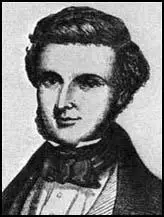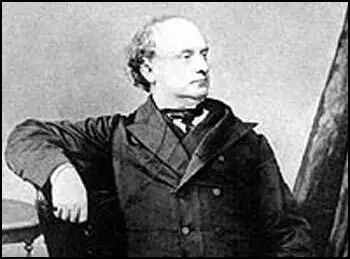Ernest Jones

Ernest Jones, the son of Major Charles Jones, the equerry to William, Duke of Cumberland, was born in Berlin on 25th January, 1819. Major Jones and his family lived at Reinbeck, Holstein, until it was decided to move back to England in 1838.
Ernest Jones began training as a lawyer in 1838 and six years later he qualified as a Barrister. While a student, Jones married Jane Atherley, the daughter of a large landowner in Cumberland, in June 1841. Jones inherited his father's property on his death in 1844, but some unwise business decisions resulted in bankruptcy.
In 1846 Jones joined the Chartist Movement and soon became a follower of Feargus O'Connor, the leader of the Physical Force movement. A good orator, organizer and writer, Jones was highly valued by O'Connor who employed him as a journalist on the Northern Star. O'Connor and Jones became co-editors of The Labourer, a new monthly journal of literature and politics.
Jones also wrote poetry and his book Chartist Songs, were published in August 1846. In 1847 worked closely with George Julian Harney and the two men met and were influenced by Karl Marx and Friedrich Engels. Harney and Jones now considered themselves as socialists, and suggested that Chartism should become a "workers' party". In July 1847, Jones stood as the Radical candidate in Halifax, but obtained only 208 votes.
On 6th June 1848, Jones was arrested for making a seditious speech where he predicted that the "green flag of Chartism will soon be flying over Downing Street". Jones was found guilty and sentenced to two years in Tothill Fields Prison, Westminster. Conditions in the prison were appalling and two of his fellow Chartist prisoners died of cholera. As Jones refused to pick oakum in prison he was placed in solitary confinement. Kept in a dark and damp 13 ft. by 6 ft. cell, Jones' health was badly damaged during this period. As a further punishment, Jones was fed on bread and water and was refused permission to have a pen, ink or paper. With the help of friends, Jones was able to keep writing and while in prison he produced his epic poem, The Revolt of Hindostan.
R. G. Gammage argued: "Ernest Jones poetry received the most unqualified praise of the most aristocratic journals; he was hailed by all of them as a great poet - one of the greatest of modern times. In 1846 Jones became a politician as well as a poet. Unknown previously to the working class, he came into their ranks under the patronage of Feargus O'Connor. Jones was small in stature; but his voice was stentorian, his delivery good, his language brilliant, his action heroic - and, above all, he had a concealed cunning. In the art of flattery, no demagogue ever excelled him."
After his release from prison in July 1850, Jones wrote for the Red Republican. The following year George Julian Harney and Jones started a new radical newspaper, The Friend of the People. After a dispute with Harney in 1851, Jones started his own journal, The People's Paper. Jones attempted to publish what he hoped would be a "complete newspaper". As well as news of the Chartist movement, The People's Paper included reports of parliamentary debates, public meeting and what Jones called "legal, political, mercantile and general intelligence." The newspaper became a socialist newspaper and one of his main contributors included Karl Marx, who was now living in exile in London.
Although Chartism was in decline, Jones realised that it was virtually important that at least one newspaper remained that promoted universal suffrage. Jones was not able to sell enough copies to finance The People's Paper and therefore had to persuade sympathizers to donate money to pay for it to be printed. Penny collections were organised in the areas where Chartism was still strong. By May 1854, the size of the newspaper had been increased to 12 pages. It also had a pictorial supplement with engravings of events like the Crimean War. Circulation reached 3,000 but the newspaper continued to lose money and in September, 1858, The People's Paper ceased publication.

Ralph Miliband has pointed out: "A remarkable illustration of the truth that men are prisoners of their times. The circumstances of the fifties doomed him to failure as a leader of labour. He (Ernest Jones) preached social revolution to a working class that had turned away from it; he was a militant political organiser when both militancy and political organisation had been replaced by trade unionism geared to limited aims, primarily economic, as the typical form of working class actions."
Jones continued to be involved in politics and in April 1857 he stood as the Radical candidate for the Nottingham seat in the House of Commons. He received 604 votes but failed to get elected. He also published other radical papers such as The London News and The Cabinet, but the both failed to make a profit. In 1860 Jones returned to his career as a barrister, where he concentrated his efforts defending radicals, including a group of Irish Fenians charged with murder.
As well as journalism, Jones also wrote novels, his most important being: The Battleday (1855), The Painter of Florence (1856), The Emperor's Vigil (1856), The Beldagon Church (1860) and Corayda (1860).
Ernest Jones died on 26th January, 1869. An estimated 100,000 people lined the streets of Manchester during his funeral.
Primary Sources
(1) George Julian Harney, Friend of the People (1850)
In 1848, Ernest Jones was sent to prison for having spoken figuratively and with a poet's licence, of the coming day when the green flag of Chartism should fly over Downing Street. In 1850 the released patriot was received by thousands of Yorkshiremen under waving folds of the red banner. The change in the popular symbol was vastly significant. In 1848 a Chartist Convention was content to ask for the Charter, and nothing but the Charter, leaving the social question to the chances of the future. In 1851 the delegates of the people (at the Manchester convention) lift up the voices for the Charter and something more.
(2) Ernest Jones, Notes to the People (1851)
The very first, the most essential requisite of a movement is to have an organ to record its proceedings, to communicate through, with its several branches - to appeal through, to exhort through, to speak through, to defend through, to teach through. A movement that has not the mighty organ of the press at its command is but half a movement - it is a disenfranchised cause, dependent on others, pensioned on others, pauper on others for the expression of its opinions.
(3) R. G. Gammage, History of the Chartist Movement (1894)
Ernest Jones poetry received the most unqualified praise of the most aristocratic journals; he was hailed by all of them as a great poet - one of the greatest of modern times. In 1846 Jones became a politician as well as a poet. Unknown previously to the working class, he came into their ranks under the patronage of Feargus O'Connor. Jones was small in stature; but his voice was stentorian, his delivery good, his language brilliant, his action heroic - and, above all, he had a concealed cunning. In the art of flattery, no demagogue ever excelled him.
(4) Ralph Miliband, The Economist (14th June, 1952)
A remarkable illustration of the truth that men are prisoners of their times. The circumstances of the fifties doomed him to failure as a leader of labour. He (Ernest Jones) preached social revolution to a working class that had turned away from it; he was a militant political organiser when both militancy and political organisation had been replaced by trade unionism geared to limited aims, primarily economic, as the typical form of working class actions.

